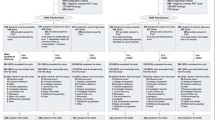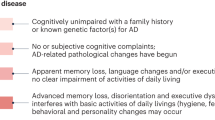Abstract
Background
Anticholinergic medication use is associated with cognitive decline and incident dementia. Our study, a prospective birth cohort analysis, aimed to determine if repeated exposure to anticholinergic medications was associated with greater decline, and whether decline was reversed with medication reduction.
Methods
From the Medical Research Council (MRC) National Survey of Health and Development, a British birth cohort with all participants born in a single week of March 1946, we quantified anticholinergic exposure between ages 53 and 69 years using the Anticholinergic Cognitive Burden Scale (ACBS). We used multinomial regression to estimate associations with global cognition, quantified by the Addenbrooke’s Cognitive Examination, 3rd Edition (ACE-III). Longitudinal associations between ACBS and cognitive test results (Verbal memory quantified by the Word Learning Test [WLT], and processing speed quantified by the Timed Letter Search Task [TLST]) at three time points (age 53, 60–64 and 69) were assessed using mixed and fixed effects linear regression models. Analyses were adjusted for sex, childhood cognition, education, chronic disease count and severity, and mental health symptoms.
Results
Anticholinergic exposure was associated cross-sectionally with lower ACE-III scores at age 69, with the greatest effects in those with high exposure at ages 60–64 (mean difference − 2.34, 95% confidence interval [CI] − 3.51 to − 1.17). Longitudinally, both mild-moderate and high ACBS scores were linked to lower WLT scores, again with high exposure showing larger effects (mean difference with contemporaneous exposure − 0.90, 95% CI − 1.63 to − 0.17; mean difference with lagged exposure − 1.53, 95% CI − 2.43 to − 0.64). Associations remained in fixed effects models (mean difference with contemporaneous exposure −1.78, 95% CI −2.85 to − 0.71; mean difference with lagged exposure − 2.23, 95% CI − 3.33 to − 1.13). Associations with TLST were noted only in isolated contemporaneous exposure (mean difference − 13.14, 95% CI − 19.04 to − 7.23; p < 0.01).
Conclusions
Anticholinergic exposure throughout mid and later life was associated with lower cognitive function. Reduced processing speed was associated only with contemporaneous anticholinergic medication use, and not historical use. Associations with lower verbal recall were evident with both historical and contemporaneous use of anticholinergic medication, and associations with historical use persisted in individuals even when their anticholinergic medication use decreased over the course of the study.



Similar content being viewed by others
References
Boustani M, Campbell N, Munger S, Maidment I, Fox C. Impact of anticholinergics on the aging brain: a review and practical application. Aging Health. 2008;4(3):311–20.
Drachman DA, Leavitt J. Human memory and the cholinergic system: a relationship to aging? Arch Neurol. 1974;30(2):113–21.
Gray SL, Anderson ML, Dublin S, Hanlon JT, Hubbard R, Walker R, et al. Cumulative use of strong anticholinergics and incident dementia: a prospective cohort study. JAMA Intern Med. 2015;175(3):401–7.
Coupland CAC, Hill T, Dening T, Morriss R, Moore M, Hippisley-Cox J. Anticholinergic drug exposure and the risk of dementia: a nested case-control study. JAMA Intern Med. 2019;179(8):1084–93.
Richardson K, Fox C, Maidment I, Steel N, Loke YK, Arthur A, et al. Anticholinergic drugs and risk of dementia: case-control study. BMJ. 2018;361.
Fox C, Richardson K, Maidment ID, Savva GM, Matthews FE, Smithard D, et al. Anticholinergic medication use and cognitive impairment in the older population: the Medical Research Council cognitive function and ageing study. J Am Geriatr Soc. 2011;59(8):1477–83.
Han L, Agostini JV, Allore HG. Cumulative anticholinergic exposure is associated with poor memory and executive function in older men. J Am Geriatr Soc. 2008;56(12):2203–10.
Moriarty F, Savva GM, Grossi CM, Bennett K, Fox C, Maidment I, et al. Cognitive decline associated with anticholinergics, benzodiazepines and Z-drugs: findings from The Irish Longitudinal Study on Ageing (TILDA). Br J Clin Pharmacol. 2021;87(7):2818–29.
Low LF, Anstey KJ, Sachdev P. Use of medications with anticholinergic properties and cognitive function in a young-old community sample. Int J Geriatr Psychiatry. 2009;24(6):578–84.
Iyer S, Lozo S, Botros C, Wang C, Warren A, Sand P, et al. Cognitive changes in women starting anticholinergic medications for overactive bladder: a prospective study. Int Urogynecol J. 2020;31(12):2653–60.
Taylor-Rowan M, Edwards S, Noel-Storr AH, McCleery J, Myint PK, Soiza R, et al. Anticholinergic burden (prognostic factor) for prediction of dementia or cognitive decline in older adults with no known cognitive syndrome. Cochrane Database Syst Rev. 2021;5: CD013540.
Pieper NT, Grossi CM, Chan WY, Loke YK, Savva GM, Haroulis C, et al. Anticholinergic drugs and incident dementia, mild cognitive impairment and cognitive decline: a meta-analysis. Age Ageing. 2020;49(6):939–47.
Salahudeen MS, Duffull SB, Nishtala PS. Impact of anticholinergic discontinuation on cognitive outcomes in older people: a systematic review. Drugs Aging. 2014;31(3):185–92.
Braithwaite E, Todd OM, Atkin A, Hulatt R, Tadrous R, Alldred DP, et al. Interventions for reducing anticholinergic medication burden in older adults-a systematic review and meta-analysis. Age Ageing. 2023;52(9):afad176.
Kuh D, Pierce M, Adams J, Deanfield J, Ekelund U, Friberg P, et al. Cohort profile: updating the cohort profile for the MRC National Survey of Health and Development: a new clinic-based data collection for ageing research. Int J Epidemiol. 2011;40(1):e1-9.
Kuh D, Wong A, Shah I, Moore A, Popham M, Curran P, et al. The MRC National Survey of Health and Development reaches age 70: maintaining participation at older ages in a birth cohort study. Eur J Epidemiol. 2016;31(11):1135–47.
Mathuranath PS, Nestor PJ, Berrios GE, Rakowicz W, Hodges JR. A brief cognitive test battery to differentiate Alzheimer’s disease and frontotemporal dementia. Neurology. 2000;55:1613–20.
Campbell NL, Maidment I, Fox C, Khan B, Boustani M. The 2012 update to the anticholinergic cognitive burden scale. J Am Geriatrics Soc. 2013;61:S142–3.
Richards M, James SN, Sizer A, Sharma N, Rawle M, Davis DHJ, et al. Identifying the lifetime cognitive and socioeconomic antecedents of cognitive state: seven decades of follow-up in a British birth cohort study. BMJ Open. 2019;9(4):e024404.
James SN, Davis D, O’Hare C, Sharma N, John A, Gaysina D, et al. Lifetime affective problems and later-life cognitive state: Over 50 years of follow-up in a British birth cohort study. J Affect Disord. 2018;1(241):348–55.
Pigeon D. Tests used in the 1954 and 1957 surveys. In: Douglas J, editor. The home and the school. London: Macgibbon & Kee; 1964.
Pigeon D. All our future. London: Davies; 1968.
Rawle MJ, Richards M, Davis D, Kuh D. The prevalence and determinants of polypharmacy at age 69: a British birth cohort study. BMC Geriatr. 2018;18(1):118.
Bergmann M, Byers T, Freedman D, Mokdad A. Validity of self-reported diagnoses leading to hospitalization: a comparison of self-reports with hospital records in a prospective study of American adults. Am J Epidemiol. 1998;147(10):969–77.
Goldberg DP, Hillier VF. A scaled version of the General Health Questionnaire. Psychol Med. 1979;9(1):139–45.
Hatch SL, Mishra G, Hotopf M, Jones PB, Kuh D. Appraisals of stressors and common mental disorder from early to mid-adulthood in the 1946 British birth cohort. J Affect Disord. 2009;119(1–3):66–75.
White I, Royston P, Wood A. Multiple imputation using chained equations: Issues and guidance for practice. Stat Med. 2011;30(4):377–99.
Anderson ML. Multiple inference and gender differences in the effects of early intervention: a reevaluation of the abecedarian, Perry preschool, and early training projects. J Am Stat Assoc. 2012;103(484):1481–95.
Rawle MJ, Cooper R, Kuh D, Richards M. Associations between polypharmacy and cognitive and physical capability: a British birth cohort study. J Am Geriatr Soc. 2018;66(5):916–23.
Hofer S, Sliwinski M. Design and analysis of longitudinal studies on aging. In: Birren J, Schaie K, editors. Handbook of the psychology of aging. 6th ed. Burlington: Elsevier Academic Press; 2006. p. 15–37.
Caskie G, Willis S. Congruence of self-reported medications with pharmacy prescription records in low-income older adults. Gerontologist. 2004;44(2):176–85.
Kashyap M, Belleville S, Mulsant BH, Hilmer SN, Paquette A, le Tu M, et al. Methodological challenges in determining longitudinal associations between anticholinergic drug use and incident cognitive decline. J Am Geriatr Soc. 2014;62(2):336–41.
Lisibach A, Benelli V, Ceppi MG, Waldner-Knogler K, Csajka C, Lutters M. Quality of anticholinergic burden scales and their impact on clinical outcomes: a systematic review. Eur J Clin Pharmacol. 2021;77(2):147–62.
Davis D, Bendayan R, Muniz Terrera G, Hardy R, Richards M, Kuh D. Decline in search speed and verbal memory over 26 years of midlife in a british birth cohort. Neuroepidemiology. 2017;49(3–4):121–8.
Salmon D, Bondi M. Neuropsychology of Alzheimer disease. In: Terry R, Katzman R, Bick K, Sisodia S, editors. Alzheimer disease. 2nd ed. Philadelphia: Lippincott Williams & Wilkins; 1999. p. 39–56.
Wurtman R. How anticholinergic drugs might promote Alzheimer’s disease: more amyloid-β and less phosphatidylcholine. J Alzheimers Dis. 2015;46(4):983–7.
Perry E, Kilford L, Lees A, Burn D, Perry R. Increased Alzheimer pathology in Parkinson’s disease related to antimuscarinic drugs. Ann Neurol. 2003;54:235–8.
Yoshiyama Y, Kojima A, Itoh K, Isose S, Koide M, Hori K, et al. Does anticholinergic activity affect neuropathology? Implication of neuroinflammation in Alzheimer’s disease. Neurodegener Dis. 2015;15(3):140–8.
Risacher SL, McDonald BC, Tallman EF, West JD, Farlow MR, Unverzagt FW, et al. Association between anticholinergic medication use and cognition, brain metabolism, and brain atrophy in cognitively normal older adults. JAMA Neurol. 2016;73(6):721–32.
Acknowledgements
We thank National Survey of Health and Development (NSHD) study members for their lifelong participation, and past and present members of the NSHD study team who helped to collect the data. The abstract for provisional findings from this paper was previously accepted for oral presentation at the European Geriatric Medicine Society Congress 2022 in London, UK (LBO-07 in Abstracts of the 18th Congress of the European Geriatric Medicine Society. Eur Geriatr Med 13 (Suppl 1), 1–439 (2022). https://doi.org/10.1007/s41999-022-00711-8).
Author information
Authors and Affiliations
Corresponding author
Ethics declarations
Sponsor’s role
No financial sponsors played any role in the design, execution, analysis and interpretation of data or writing of this study.
Funding
There was no direct funding for this project. The NSHD is funded by the Medical Research Council (MRC) (MC_UU_10019/1, MC_UU_10019/3).
Conflict of interest
The authors have no conflicts.
Ethics approval
Ethical approval for the NSHD data collection at age 68–69 was obtained from the Queen Square Research Ethics Committee (14/LO/1073) and the Scotland A Research Ethics Committee (14/SS/1009). At each stage of data collection, all participants provided written informed consent.
Consent to participate
All participants provided written informed consent for participation during recruitment into the NSHD and for all ongoing data collections.
Consent for publication
Not applicable (anonymised study).
Availability of data and material
Data and code are available on request to the NSHD Data Sharing Committee. NSHD data sharing policies and processes meet the requirements and expectations of the UK MRC policy on sharing of data from population and patient cohorts. Data requests should be submitted to rclha.swiftinfo@ucl.ac.uk; further details can be found at http://www.nshd.mrc.ac.uk/data.aspx. These policies and processes are in place to ensure that the use of data from this national birth cohort study is within the bounds of consent given previously by study members, complies with MRC guidance on ethics and research governance, and meets rigorous MRC data security standards.
Code availability
All code was compiled using Stata MP Version 17 (64-bit), and is available on GitHub (https://github.com/orgs/Lifelong-Health-Ageing/repositories).
Author contributions
MJR was responsible for data analysis, with additional input from DD. MJR devised the research question and wrote the first draft of the manuscript. MR, PP, AGI and WL provided additional statistical and methodological input. All authors contributed to interpreting the data and writing the final paper.
Supplementary Information
Below is the link to the electronic supplementary material.
Rights and permissions
Springer Nature or its licensor (e.g. a society or other partner) holds exclusive rights to this article under a publishing agreement with the author(s) or other rightsholder(s); author self-archiving of the accepted manuscript version of this article is solely governed by the terms of such publishing agreement and applicable law.
About this article
Cite this article
Rawle, M.J., Lau, W.C.Y., Gonzalez-Izquierdo, A. et al. Associations Between Midlife Anticholinergic Medication Use and Subsequent Cognitive Decline: A British Birth Cohort Study. Drugs Aging (2024). https://doi.org/10.1007/s40266-024-01116-x
Accepted:
Published:
DOI: https://doi.org/10.1007/s40266-024-01116-x




